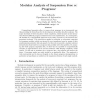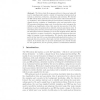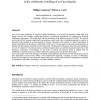30 search results - page 6 / 6 » Interpreting Abduction in CLP |
AGP
1996
IEEE
13 years 9 months ago
1996
IEEE
Compositional semantics allow to reason about programs in an incremental way, thus providing the formal base for the development of modular data-flow analyses. The major drawback ...
HICSS
2007
IEEE
13 years 11 months ago
2007
IEEE
Technology to support knowledge transfer and cooperative inquiry must offer its users the ability to effectively interpret knowledge structures produced by collaborators. Communic...
ANLP
1992
13 years 5 months ago
1992
It is often assumed that when natural language processing meets the real world, the ideal of aiming for complete and correct interpretations has to be abandoned. However, our expe...
ILP
2003
Springer
13 years 10 months ago
2003
Springer
We believe that AI programs written for discovery tasks will need to simultaneously employ a variety of reasoning techniques such as induction, abduction, deduction, calculation an...
AAI
2005
13 years 4 months ago
2005
1 One of the major challenges of Applied Artificial Intelligence is to provide environments where high level human activities like learning, constructing theories or performing exp...



